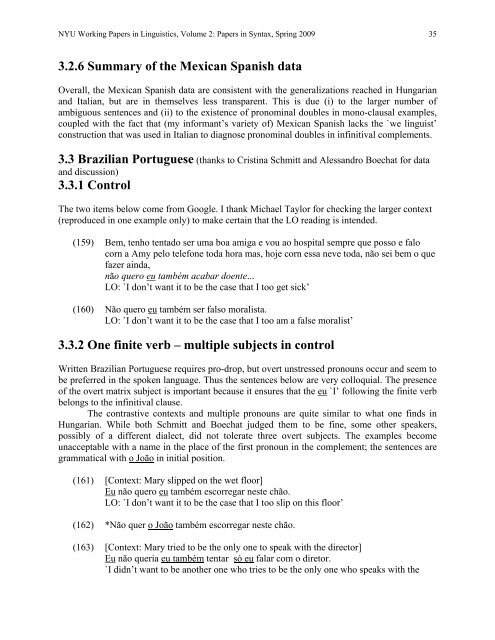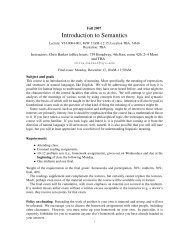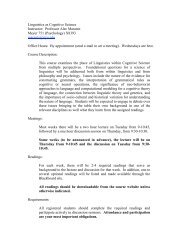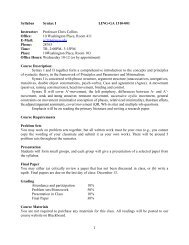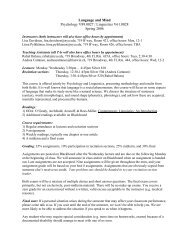Overt Nominative Subjects in Infinitival Complements Cross - NYU ...
Overt Nominative Subjects in Infinitival Complements Cross - NYU ...
Overt Nominative Subjects in Infinitival Complements Cross - NYU ...
Create successful ePaper yourself
Turn your PDF publications into a flip-book with our unique Google optimized e-Paper software.
<strong>NYU</strong> Work<strong>in</strong>g Papers <strong>in</strong> L<strong>in</strong>guistics, Volume 2: Papers <strong>in</strong> Syntax, Spr<strong>in</strong>g 2009 353.2.6 Summary of the Mexican Spanish dataOverall, the Mexican Spanish data are consistent with the generalizations reached <strong>in</strong> Hungarianand Italian, but are <strong>in</strong> themselves less transparent. This is due (i) to the larger number ofambiguous sentences and (ii) to the existence of pronom<strong>in</strong>al doubles <strong>in</strong> mono-clausal examples,coupled with the fact that (my <strong>in</strong>formant’s variety of) Mexican Spanish lacks the `we l<strong>in</strong>guist’construction that was used <strong>in</strong> Italian to diagnose pronom<strong>in</strong>al doubles <strong>in</strong> <strong>in</strong>f<strong>in</strong>itival complements.3.3 Brazilian Portuguese (thanks to Crist<strong>in</strong>a Schmitt and Alessandro Boechat for dataand discussion)3.3.1 ControlThe two items below come from Google. I thank Michael Taylor for check<strong>in</strong>g the larger context(reproduced <strong>in</strong> one example only) to make certa<strong>in</strong> that the LO read<strong>in</strong>g is <strong>in</strong>tended.(159) Bem, tenho tentado ser uma boa amiga e vou ao hospital sempre que posso e falocorn a Amy pelo telefone toda hora mas, hoje corn essa neve toda, não sei bem o quefazer a<strong>in</strong>da,não quero eu também acabar doente...LO: `I don’t want it to be the case that I too get sick’(160) Não quero eu também ser falso moralista.LO: `I don’t want it to be the case that I too am a false moralist’3.3.2 One f<strong>in</strong>ite verb – multiple subjects <strong>in</strong> controlWritten Brazilian Portuguese requires pro-drop, but overt unstressed pronouns occur and seem tobe preferred <strong>in</strong> the spoken language. Thus the sentences below are very colloquial. The presenceof the overt matrix subject is important because it ensures that the eu `I’ follow<strong>in</strong>g the f<strong>in</strong>ite verbbelongs to the <strong>in</strong>f<strong>in</strong>itival clause.The contrastive contexts and multiple pronouns are quite similar to what one f<strong>in</strong>ds <strong>in</strong>Hungarian. While both Schmitt and Boechat judged them to be f<strong>in</strong>e, some other speakers,possibly of a different dialect, did not tolerate three overt subjects. The examples becomeunacceptable with a name <strong>in</strong> the place of the first pronoun <strong>in</strong> the complement; the sentences aregrammatical with o João <strong>in</strong> <strong>in</strong>itial position.(161) [Context: Mary slipped on the wet floor]Eu não quero eu também escorregar neste chão.LO: `I don’t want it to be the case that I too slip on this floor’(162) *Não quer o João também escorregar neste chão.(163) [Context: Mary tried to be the only one to speak with the director]Eu não queria eu também tentar só eu falar com o diretor.`I didn’t want to be another one who tries to be the only one who speaks with the


